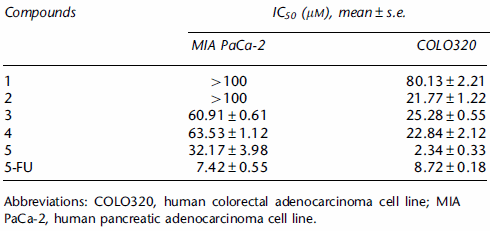|
These Echinacea components kill cancer cells
Echinacea pallida contains substances that kill cancer cells in vitro. Italian researchers at the University of Pisa discovered this in an older study, which they published in the British Journal of Pharmacology in 2008. These phytochemicals are similar to the polyacetylenes in Apiaceae vegetables like carrot, parsnip, and sellerie. We have written about these a few times already.
Study
The Italians extracted two polyacetylenes and three polyenes from the roots of Echinacea pallida. They then exposed Colo320 colon cancer cells and Mia-PaCa-2 pancreatic cancer cells to those substances in test tubes.


Results
The table below tells at what concentration the five phytochemicals killed half of the cancer cells. The researchers compared the cytotoxic effects of the substances with those of the cancer medicine 5-fluorouracil [5-FU].



Compound 5 in Echinacea pallida turned out to be the most bioactive. The Italians were able to demonstrate that this polyene activates suicide enzymes caspase-3 and -7 in the two cancer cell types, after which the cells die by apoptosis.
Relevance
Although they have only done in vitro studies, the Italians think their findings are also relevant to humans. In another test tube test, the researchers were able to demonstrate that intestinal cells can absorb compound 5. The substance may therefore be bioavailable.
"These data encourage further investigation to clarify the exact mechanism of action of this polyene", write the Italians.
Source:
Br J Pharmacol. 2008 Mar;153(5):879-85.
More:
Echinacea kills colon cancer cells 27.11.2012
Archives:
Cancer Prevention & Survival
Colon Cancer
Echinacea
|
|









